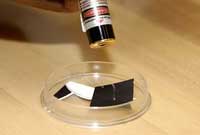 A team of scientists from the University of Delaware (USA) has achieved promising preliminary results, opening up a bright prospect in the fight against cancer. They are researching the development of “nano bombs” that can explode cancer tumors.
A team of scientists from the University of Delaware (USA) has achieved promising preliminary results, opening up a bright prospect in the fight against cancer. They are researching the development of “nano bombs” that can explode cancer tumors.
Balaji Panchapakesan, Associate Professor of Electrical and Computer Engineering at the University of Delaware and the head of the research team, stated that the research is still in its early stages and requires further in-depth studies and clinical trials before this technology can be applied to human treatment.
“There is no room for error; we are focused on eradicating cancer at its root,” Panchapakesan said. He further explained that these nano bombs are the result of over two years of research on carbon nanotubes (which are made of carbon atoms arranged in a tubular structure). In the initial phase, he mentioned that the research team considered using carbon nanotubes as drug delivery devices. Due to their size being smaller than that of a single cell, these nanotubes can deliver drugs with high precision to individual cells.
However, the research team made a shocking discovery when the effectiveness of the nanotubes was demonstrated through various experiments: using the nanotubes to create “nano bombs”. These bombs are surrounded by carbon nanotubes and can explode.
When the researchers witnessed the explosion of these nano bombs, they were fully convinced that they could use them to destroy cancer cells. The research team replicated the explosion of the “nano bomb” in a solution consisting of water, phosphate, and salt. This means that these nano bombs could potentially be used within the human body.
“In reality, this nano bomb is localized to a specific area of the body, and its potential to affect other areas is minimal. That is why I refer to it as a ‘nano pain’; in other words, it can cause a very slight discomfort similar to a pinprick,” Panchapakesan explained. He is also fully confident that this type of nano bomb will be a potential method for destroying cancer cells, especially for breast cancer. It is significantly more effective than current treatment methods due to its strong, selective impact that is non-destructive and non-toxic, and it can be combined with existing methods, including microsurgery.
So far, nanotechnology has proven to have many significant applications, such as in cancer treatment and diagnosis. Panchapakesan also predicts that nanobots or nano surgical devices could be inserted deep into the human body to remove tumors in areas where traditional medical methods cannot reach.



















































